Entrepreneurship Report: Start-ups, SMEs and Social Economic Growth
VerifiedAdded on 2020/10/22
|16
|4389
|156
Report
AI Summary
This report delves into the realm of entrepreneurship, examining the dynamics of start-ups and small and medium-sized enterprises (SMEs). It begins by defining key terms like 'entrepreneur' and 'entrepreneurship,' and then explores various types of entrepreneurial ventures, including small business, scalable start-up, large-scale, and social entrepreneurship. The report also differentiates between these ventures, highlighting their similarities and differences. Furthermore, the report emphasizes the significance of SMEs in the UK economy, including their impact on job creation, economic growth, and local, regional, national, and international levels. The report also touches upon the influence of micro-businesses, and the contribution of these enterprises to the UK's economic landscape, including their role in employment, tax revenue, and innovation. The analysis includes the effect of SMEs on the UK economy, emphasizing the importance of supporting small businesses for overall economic development.

ENTREPRENEURSHIP
Paraphrase This Document
Need a fresh take? Get an instant paraphrase of this document with our AI Paraphraser
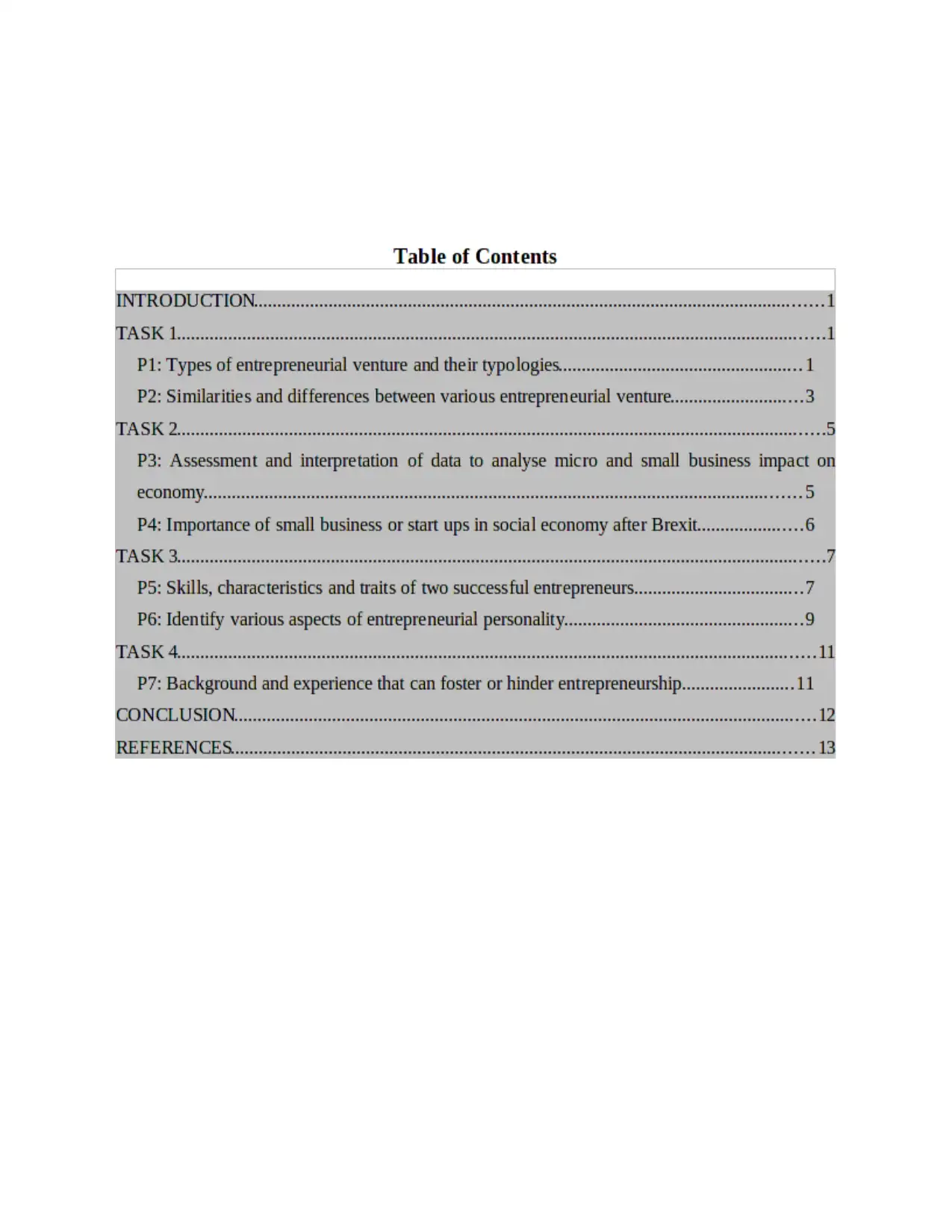
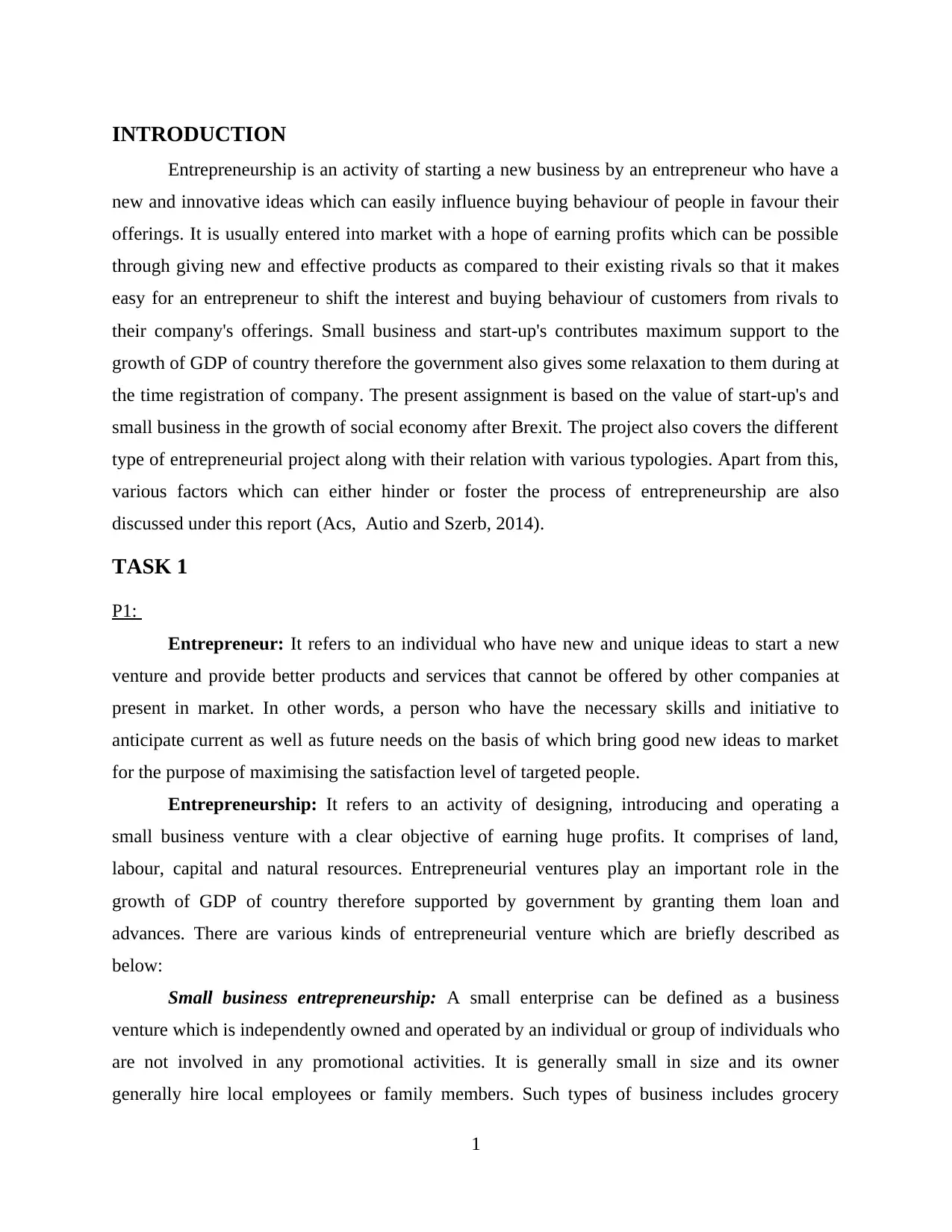
INTRODUCTION
Entrepreneurship is an activity of starting a new business by an entrepreneur who have a
new and innovative ideas which can easily influence buying behaviour of people in favour their
offerings. It is usually entered into market with a hope of earning profits which can be possible
through giving new and effective products as compared to their existing rivals so that it makes
easy for an entrepreneur to shift the interest and buying behaviour of customers from rivals to
their company's offerings. Small business and start-up's contributes maximum support to the
growth of GDP of country therefore the government also gives some relaxation to them during at
the time registration of company. The present assignment is based on the value of start-up's and
small business in the growth of social economy after Brexit. The project also covers the different
type of entrepreneurial project along with their relation with various typologies. Apart from this,
various factors which can either hinder or foster the process of entrepreneurship are also
discussed under this report (Acs, Autio and Szerb, 2014).
TASK 1
P1:
Entrepreneur: It refers to an individual who have new and unique ideas to start a new
venture and provide better products and services that cannot be offered by other companies at
present in market. In other words, a person who have the necessary skills and initiative to
anticipate current as well as future needs on the basis of which bring good new ideas to market
for the purpose of maximising the satisfaction level of targeted people.
Entrepreneurship: It refers to an activity of designing, introducing and operating a
small business venture with a clear objective of earning huge profits. It comprises of land,
labour, capital and natural resources. Entrepreneurial ventures play an important role in the
growth of GDP of country therefore supported by government by granting them loan and
advances. There are various kinds of entrepreneurial venture which are briefly described as
below:
Small business entrepreneurship: A small enterprise can be defined as a business
venture which is independently owned and operated by an individual or group of individuals who
are not involved in any promotional activities. It is generally small in size and its owner
generally hire local employees or family members. Such types of business includes grocery
1
Entrepreneurship is an activity of starting a new business by an entrepreneur who have a
new and innovative ideas which can easily influence buying behaviour of people in favour their
offerings. It is usually entered into market with a hope of earning profits which can be possible
through giving new and effective products as compared to their existing rivals so that it makes
easy for an entrepreneur to shift the interest and buying behaviour of customers from rivals to
their company's offerings. Small business and start-up's contributes maximum support to the
growth of GDP of country therefore the government also gives some relaxation to them during at
the time registration of company. The present assignment is based on the value of start-up's and
small business in the growth of social economy after Brexit. The project also covers the different
type of entrepreneurial project along with their relation with various typologies. Apart from this,
various factors which can either hinder or foster the process of entrepreneurship are also
discussed under this report (Acs, Autio and Szerb, 2014).
TASK 1
P1:
Entrepreneur: It refers to an individual who have new and unique ideas to start a new
venture and provide better products and services that cannot be offered by other companies at
present in market. In other words, a person who have the necessary skills and initiative to
anticipate current as well as future needs on the basis of which bring good new ideas to market
for the purpose of maximising the satisfaction level of targeted people.
Entrepreneurship: It refers to an activity of designing, introducing and operating a
small business venture with a clear objective of earning huge profits. It comprises of land,
labour, capital and natural resources. Entrepreneurial ventures play an important role in the
growth of GDP of country therefore supported by government by granting them loan and
advances. There are various kinds of entrepreneurial venture which are briefly described as
below:
Small business entrepreneurship: A small enterprise can be defined as a business
venture which is independently owned and operated by an individual or group of individuals who
are not involved in any promotional activities. It is generally small in size and its owner
generally hire local employees or family members. Such types of business includes grocery
1
⊘ This is a preview!⊘
Do you want full access?
Subscribe today to unlock all pages.

Trusted by 1+ million students worldwide
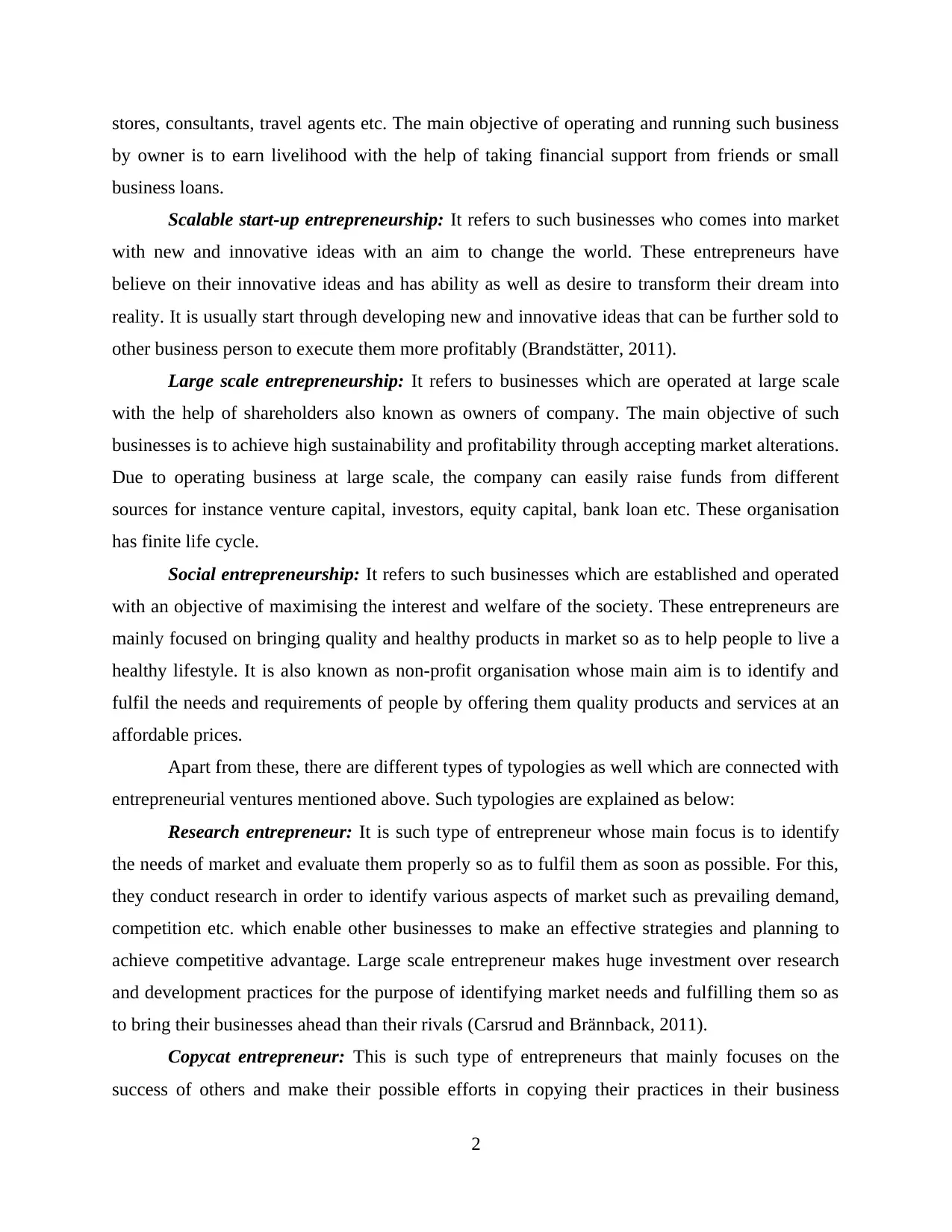
stores, consultants, travel agents etc. The main objective of operating and running such business
by owner is to earn livelihood with the help of taking financial support from friends or small
business loans.
Scalable start-up entrepreneurship: It refers to such businesses who comes into market
with new and innovative ideas with an aim to change the world. These entrepreneurs have
believe on their innovative ideas and has ability as well as desire to transform their dream into
reality. It is usually start through developing new and innovative ideas that can be further sold to
other business person to execute them more profitably (Brandstätter, 2011).
Large scale entrepreneurship: It refers to businesses which are operated at large scale
with the help of shareholders also known as owners of company. The main objective of such
businesses is to achieve high sustainability and profitability through accepting market alterations.
Due to operating business at large scale, the company can easily raise funds from different
sources for instance venture capital, investors, equity capital, bank loan etc. These organisation
has finite life cycle.
Social entrepreneurship: It refers to such businesses which are established and operated
with an objective of maximising the interest and welfare of the society. These entrepreneurs are
mainly focused on bringing quality and healthy products in market so as to help people to live a
healthy lifestyle. It is also known as non-profit organisation whose main aim is to identify and
fulfil the needs and requirements of people by offering them quality products and services at an
affordable prices.
Apart from these, there are different types of typologies as well which are connected with
entrepreneurial ventures mentioned above. Such typologies are explained as below:
Research entrepreneur: It is such type of entrepreneur whose main focus is to identify
the needs of market and evaluate them properly so as to fulfil them as soon as possible. For this,
they conduct research in order to identify various aspects of market such as prevailing demand,
competition etc. which enable other businesses to make an effective strategies and planning to
achieve competitive advantage. Large scale entrepreneur makes huge investment over research
and development practices for the purpose of identifying market needs and fulfilling them so as
to bring their businesses ahead than their rivals (Carsrud and Brännback, 2011).
Copycat entrepreneur: This is such type of entrepreneurs that mainly focuses on the
success of others and make their possible efforts in copying their practices in their business
2
by owner is to earn livelihood with the help of taking financial support from friends or small
business loans.
Scalable start-up entrepreneurship: It refers to such businesses who comes into market
with new and innovative ideas with an aim to change the world. These entrepreneurs have
believe on their innovative ideas and has ability as well as desire to transform their dream into
reality. It is usually start through developing new and innovative ideas that can be further sold to
other business person to execute them more profitably (Brandstätter, 2011).
Large scale entrepreneurship: It refers to businesses which are operated at large scale
with the help of shareholders also known as owners of company. The main objective of such
businesses is to achieve high sustainability and profitability through accepting market alterations.
Due to operating business at large scale, the company can easily raise funds from different
sources for instance venture capital, investors, equity capital, bank loan etc. These organisation
has finite life cycle.
Social entrepreneurship: It refers to such businesses which are established and operated
with an objective of maximising the interest and welfare of the society. These entrepreneurs are
mainly focused on bringing quality and healthy products in market so as to help people to live a
healthy lifestyle. It is also known as non-profit organisation whose main aim is to identify and
fulfil the needs and requirements of people by offering them quality products and services at an
affordable prices.
Apart from these, there are different types of typologies as well which are connected with
entrepreneurial ventures mentioned above. Such typologies are explained as below:
Research entrepreneur: It is such type of entrepreneur whose main focus is to identify
the needs of market and evaluate them properly so as to fulfil them as soon as possible. For this,
they conduct research in order to identify various aspects of market such as prevailing demand,
competition etc. which enable other businesses to make an effective strategies and planning to
achieve competitive advantage. Large scale entrepreneur makes huge investment over research
and development practices for the purpose of identifying market needs and fulfilling them so as
to bring their businesses ahead than their rivals (Carsrud and Brännback, 2011).
Copycat entrepreneur: This is such type of entrepreneurs that mainly focuses on the
success of others and make their possible efforts in copying their practices in their business
2
Paraphrase This Document
Need a fresh take? Get an instant paraphrase of this document with our AI Paraphraser
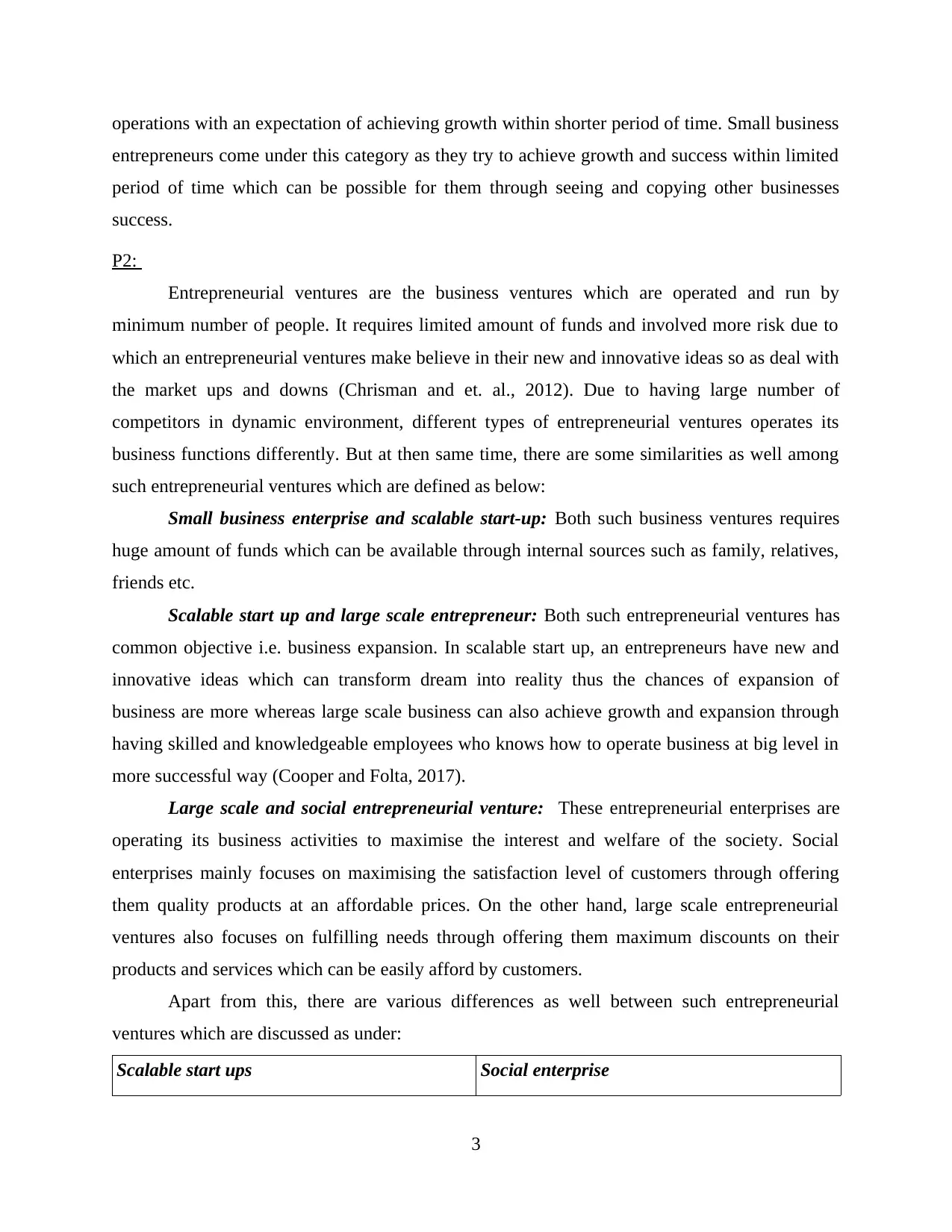
operations with an expectation of achieving growth within shorter period of time. Small business
entrepreneurs come under this category as they try to achieve growth and success within limited
period of time which can be possible for them through seeing and copying other businesses
success.
P2:
Entrepreneurial ventures are the business ventures which are operated and run by
minimum number of people. It requires limited amount of funds and involved more risk due to
which an entrepreneurial ventures make believe in their new and innovative ideas so as deal with
the market ups and downs (Chrisman and et. al., 2012). Due to having large number of
competitors in dynamic environment, different types of entrepreneurial ventures operates its
business functions differently. But at then same time, there are some similarities as well among
such entrepreneurial ventures which are defined as below:
Small business enterprise and scalable start-up: Both such business ventures requires
huge amount of funds which can be available through internal sources such as family, relatives,
friends etc.
Scalable start up and large scale entrepreneur: Both such entrepreneurial ventures has
common objective i.e. business expansion. In scalable start up, an entrepreneurs have new and
innovative ideas which can transform dream into reality thus the chances of expansion of
business are more whereas large scale business can also achieve growth and expansion through
having skilled and knowledgeable employees who knows how to operate business at big level in
more successful way (Cooper and Folta, 2017).
Large scale and social entrepreneurial venture: These entrepreneurial enterprises are
operating its business activities to maximise the interest and welfare of the society. Social
enterprises mainly focuses on maximising the satisfaction level of customers through offering
them quality products at an affordable prices. On the other hand, large scale entrepreneurial
ventures also focuses on fulfilling needs through offering them maximum discounts on their
products and services which can be easily afford by customers.
Apart from this, there are various differences as well between such entrepreneurial
ventures which are discussed as under:
Scalable start ups Social enterprise
3
entrepreneurs come under this category as they try to achieve growth and success within limited
period of time which can be possible for them through seeing and copying other businesses
success.
P2:
Entrepreneurial ventures are the business ventures which are operated and run by
minimum number of people. It requires limited amount of funds and involved more risk due to
which an entrepreneurial ventures make believe in their new and innovative ideas so as deal with
the market ups and downs (Chrisman and et. al., 2012). Due to having large number of
competitors in dynamic environment, different types of entrepreneurial ventures operates its
business functions differently. But at then same time, there are some similarities as well among
such entrepreneurial ventures which are defined as below:
Small business enterprise and scalable start-up: Both such business ventures requires
huge amount of funds which can be available through internal sources such as family, relatives,
friends etc.
Scalable start up and large scale entrepreneur: Both such entrepreneurial ventures has
common objective i.e. business expansion. In scalable start up, an entrepreneurs have new and
innovative ideas which can transform dream into reality thus the chances of expansion of
business are more whereas large scale business can also achieve growth and expansion through
having skilled and knowledgeable employees who knows how to operate business at big level in
more successful way (Cooper and Folta, 2017).
Large scale and social entrepreneurial venture: These entrepreneurial enterprises are
operating its business activities to maximise the interest and welfare of the society. Social
enterprises mainly focuses on maximising the satisfaction level of customers through offering
them quality products at an affordable prices. On the other hand, large scale entrepreneurial
ventures also focuses on fulfilling needs through offering them maximum discounts on their
products and services which can be easily afford by customers.
Apart from this, there are various differences as well between such entrepreneurial
ventures which are discussed as under:
Scalable start ups Social enterprise
3
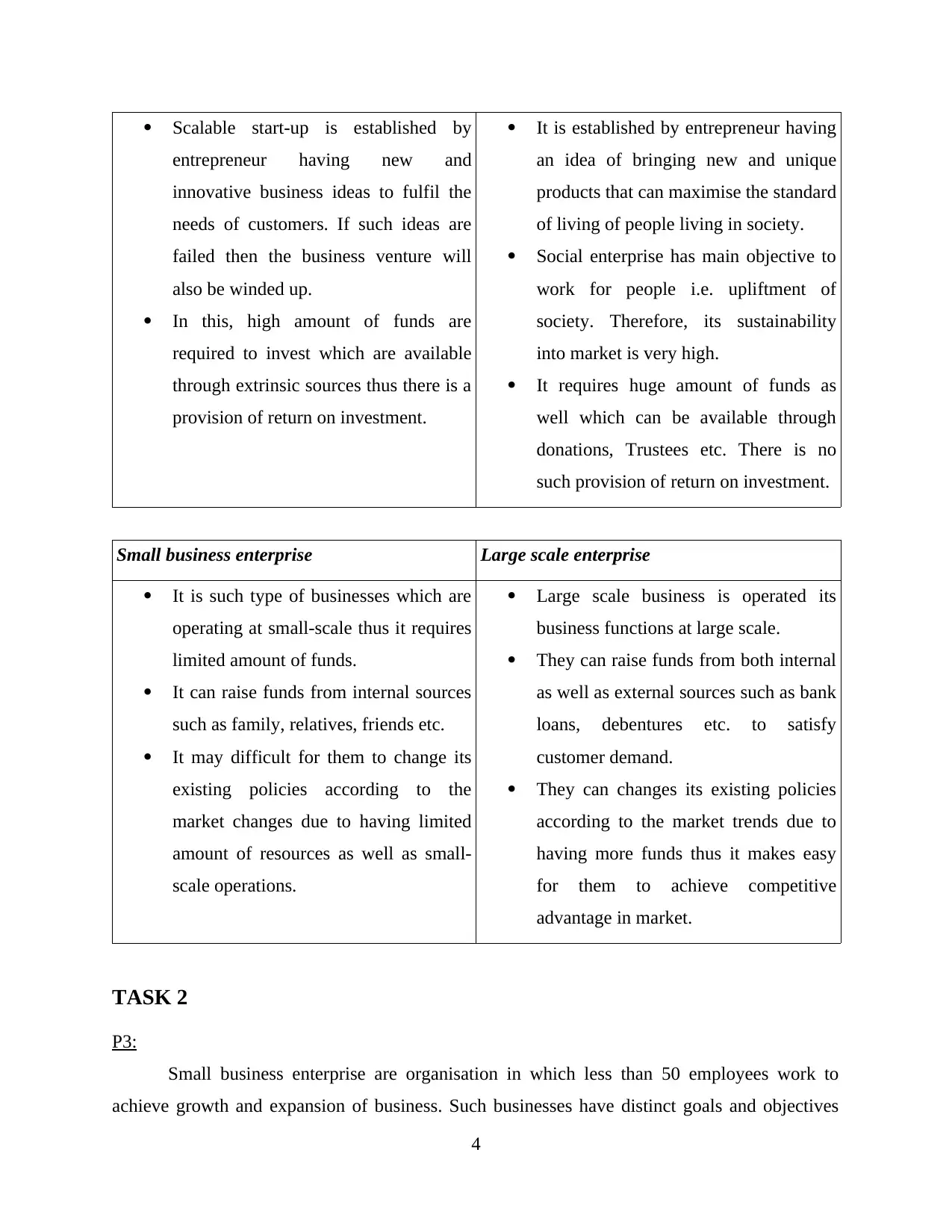
Scalable start-up is established by
entrepreneur having new and
innovative business ideas to fulfil the
needs of customers. If such ideas are
failed then the business venture will
also be winded up.
In this, high amount of funds are
required to invest which are available
through extrinsic sources thus there is a
provision of return on investment.
It is established by entrepreneur having
an idea of bringing new and unique
products that can maximise the standard
of living of people living in society.
Social enterprise has main objective to
work for people i.e. upliftment of
society. Therefore, its sustainability
into market is very high.
It requires huge amount of funds as
well which can be available through
donations, Trustees etc. There is no
such provision of return on investment.
Small business enterprise Large scale enterprise
It is such type of businesses which are
operating at small-scale thus it requires
limited amount of funds.
It can raise funds from internal sources
such as family, relatives, friends etc.
It may difficult for them to change its
existing policies according to the
market changes due to having limited
amount of resources as well as small-
scale operations.
Large scale business is operated its
business functions at large scale.
They can raise funds from both internal
as well as external sources such as bank
loans, debentures etc. to satisfy
customer demand.
They can changes its existing policies
according to the market trends due to
having more funds thus it makes easy
for them to achieve competitive
advantage in market.
TASK 2
P3:
Small business enterprise are organisation in which less than 50 employees work to
achieve growth and expansion of business. Such businesses have distinct goals and objectives
4
entrepreneur having new and
innovative business ideas to fulfil the
needs of customers. If such ideas are
failed then the business venture will
also be winded up.
In this, high amount of funds are
required to invest which are available
through extrinsic sources thus there is a
provision of return on investment.
It is established by entrepreneur having
an idea of bringing new and unique
products that can maximise the standard
of living of people living in society.
Social enterprise has main objective to
work for people i.e. upliftment of
society. Therefore, its sustainability
into market is very high.
It requires huge amount of funds as
well which can be available through
donations, Trustees etc. There is no
such provision of return on investment.
Small business enterprise Large scale enterprise
It is such type of businesses which are
operating at small-scale thus it requires
limited amount of funds.
It can raise funds from internal sources
such as family, relatives, friends etc.
It may difficult for them to change its
existing policies according to the
market changes due to having limited
amount of resources as well as small-
scale operations.
Large scale business is operated its
business functions at large scale.
They can raise funds from both internal
as well as external sources such as bank
loans, debentures etc. to satisfy
customer demand.
They can changes its existing policies
according to the market trends due to
having more funds thus it makes easy
for them to achieve competitive
advantage in market.
TASK 2
P3:
Small business enterprise are organisation in which less than 50 employees work to
achieve growth and expansion of business. Such businesses have distinct goals and objectives
4
⊘ This is a preview!⊘
Do you want full access?
Subscribe today to unlock all pages.

Trusted by 1+ million students worldwide
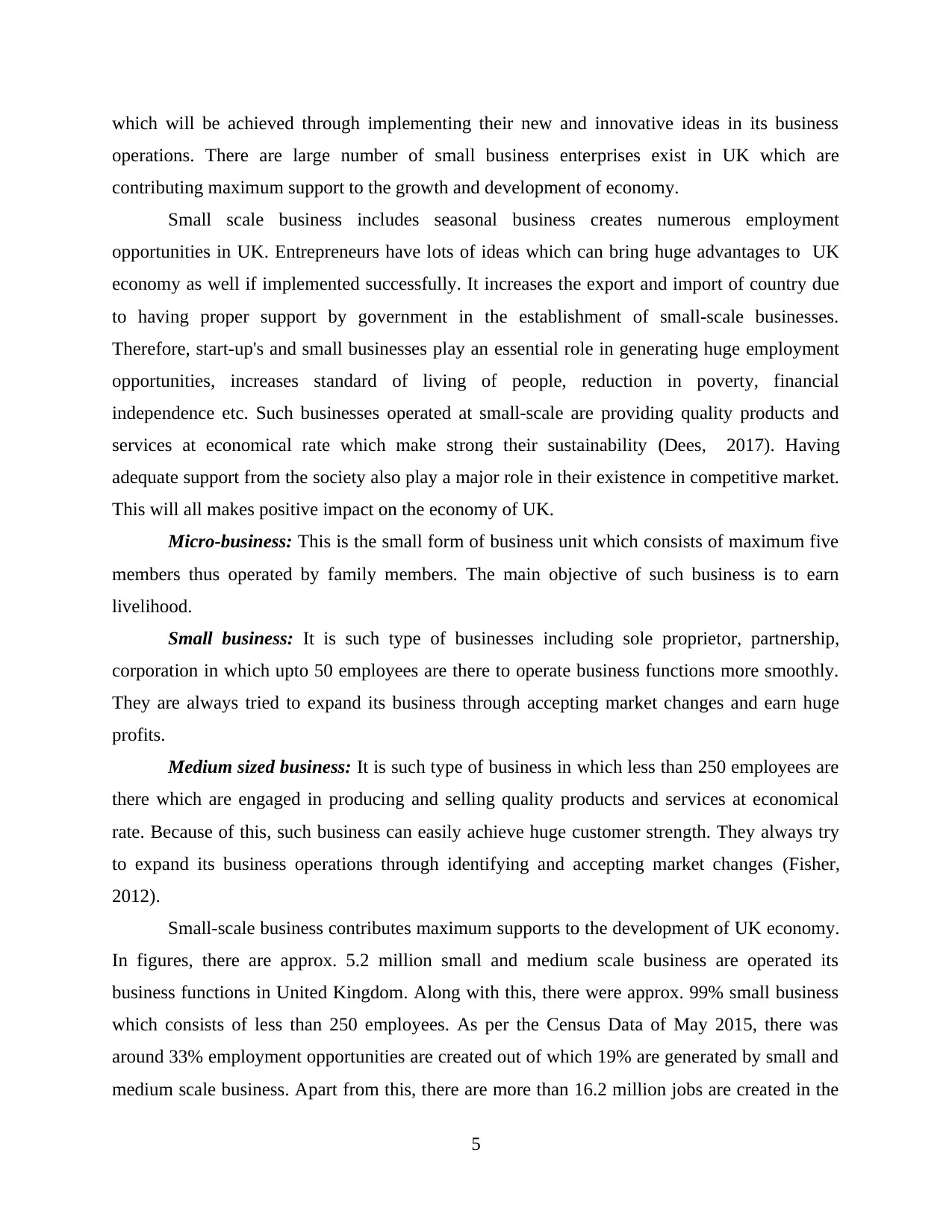
which will be achieved through implementing their new and innovative ideas in its business
operations. There are large number of small business enterprises exist in UK which are
contributing maximum support to the growth and development of economy.
Small scale business includes seasonal business creates numerous employment
opportunities in UK. Entrepreneurs have lots of ideas which can bring huge advantages to UK
economy as well if implemented successfully. It increases the export and import of country due
to having proper support by government in the establishment of small-scale businesses.
Therefore, start-up's and small businesses play an essential role in generating huge employment
opportunities, increases standard of living of people, reduction in poverty, financial
independence etc. Such businesses operated at small-scale are providing quality products and
services at economical rate which make strong their sustainability (Dees, 2017). Having
adequate support from the society also play a major role in their existence in competitive market.
This will all makes positive impact on the economy of UK.
Micro-business: This is the small form of business unit which consists of maximum five
members thus operated by family members. The main objective of such business is to earn
livelihood.
Small business: It is such type of businesses including sole proprietor, partnership,
corporation in which upto 50 employees are there to operate business functions more smoothly.
They are always tried to expand its business through accepting market changes and earn huge
profits.
Medium sized business: It is such type of business in which less than 250 employees are
there which are engaged in producing and selling quality products and services at economical
rate. Because of this, such business can easily achieve huge customer strength. They always try
to expand its business operations through identifying and accepting market changes (Fisher,
2012).
Small-scale business contributes maximum supports to the development of UK economy.
In figures, there are approx. 5.2 million small and medium scale business are operated its
business functions in United Kingdom. Along with this, there were approx. 99% small business
which consists of less than 250 employees. As per the Census Data of May 2015, there was
around 33% employment opportunities are created out of which 19% are generated by small and
medium scale business. Apart from this, there are more than 16.2 million jobs are created in the
5
operations. There are large number of small business enterprises exist in UK which are
contributing maximum support to the growth and development of economy.
Small scale business includes seasonal business creates numerous employment
opportunities in UK. Entrepreneurs have lots of ideas which can bring huge advantages to UK
economy as well if implemented successfully. It increases the export and import of country due
to having proper support by government in the establishment of small-scale businesses.
Therefore, start-up's and small businesses play an essential role in generating huge employment
opportunities, increases standard of living of people, reduction in poverty, financial
independence etc. Such businesses operated at small-scale are providing quality products and
services at economical rate which make strong their sustainability (Dees, 2017). Having
adequate support from the society also play a major role in their existence in competitive market.
This will all makes positive impact on the economy of UK.
Micro-business: This is the small form of business unit which consists of maximum five
members thus operated by family members. The main objective of such business is to earn
livelihood.
Small business: It is such type of businesses including sole proprietor, partnership,
corporation in which upto 50 employees are there to operate business functions more smoothly.
They are always tried to expand its business through accepting market changes and earn huge
profits.
Medium sized business: It is such type of business in which less than 250 employees are
there which are engaged in producing and selling quality products and services at economical
rate. Because of this, such business can easily achieve huge customer strength. They always try
to expand its business operations through identifying and accepting market changes (Fisher,
2012).
Small-scale business contributes maximum supports to the development of UK economy.
In figures, there are approx. 5.2 million small and medium scale business are operated its
business functions in United Kingdom. Along with this, there were approx. 99% small business
which consists of less than 250 employees. As per the Census Data of May 2015, there was
around 33% employment opportunities are created out of which 19% are generated by small and
medium scale business. Apart from this, there are more than 16.2 million jobs are created in the
5
Paraphrase This Document
Need a fresh take? Get an instant paraphrase of this document with our AI Paraphraser
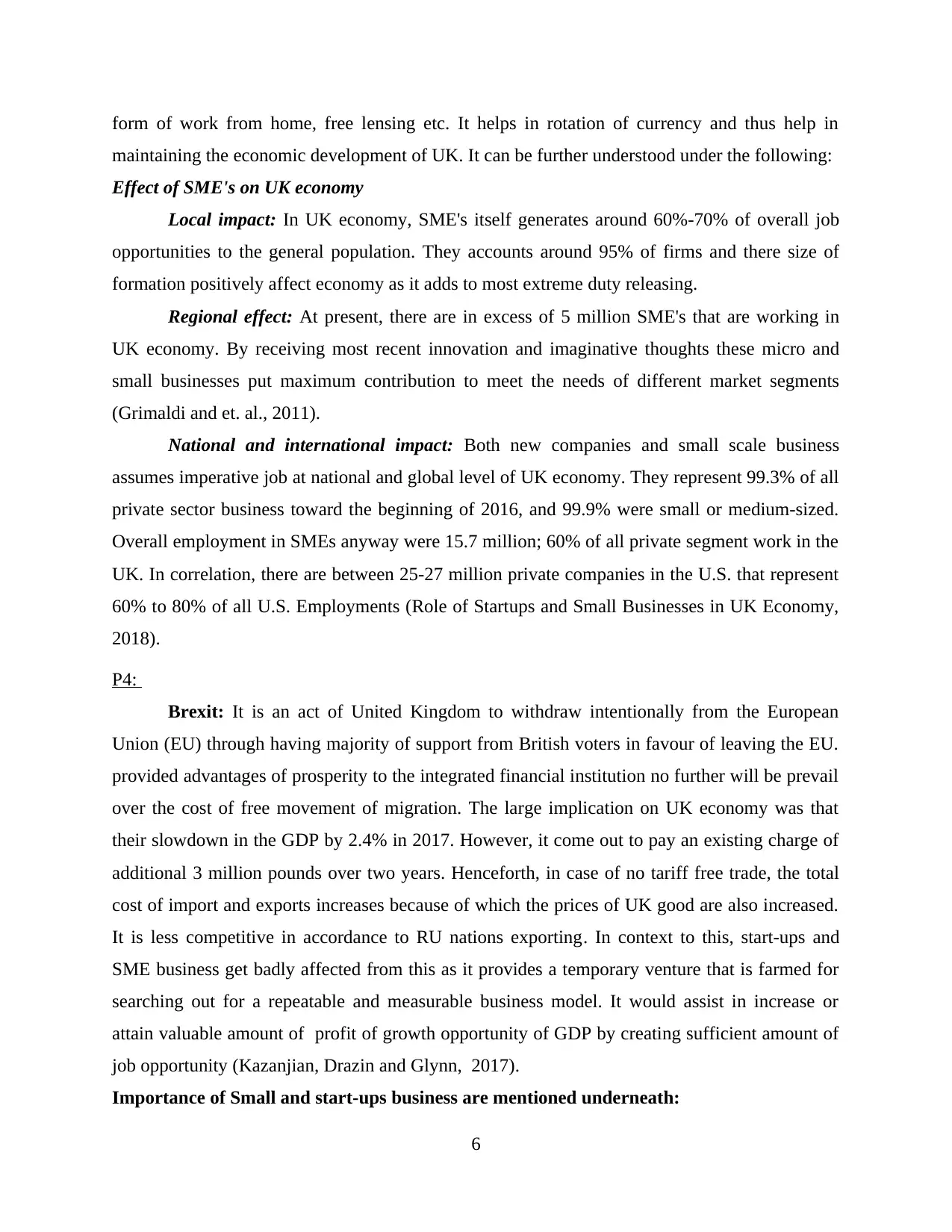
form of work from home, free lensing etc. It helps in rotation of currency and thus help in
maintaining the economic development of UK. It can be further understood under the following:
Effect of SME's on UK economy
Local impact: In UK economy, SME's itself generates around 60%-70% of overall job
opportunities to the general population. They accounts around 95% of firms and there size of
formation positively affect economy as it adds to most extreme duty releasing.
Regional effect: At present, there are in excess of 5 million SME's that are working in
UK economy. By receiving most recent innovation and imaginative thoughts these micro and
small businesses put maximum contribution to meet the needs of different market segments
(Grimaldi and et. al., 2011).
National and international impact: Both new companies and small scale business
assumes imperative job at national and global level of UK economy. They represent 99.3% of all
private sector business toward the beginning of 2016, and 99.9% were small or medium-sized.
Overall employment in SMEs anyway were 15.7 million; 60% of all private segment work in the
UK. In correlation, there are between 25-27 million private companies in the U.S. that represent
60% to 80% of all U.S. Employments (Role of Startups and Small Businesses in UK Economy,
2018).
P4:
Brexit: It is an act of United Kingdom to withdraw intentionally from the European
Union (EU) through having majority of support from British voters in favour of leaving the EU.
provided advantages of prosperity to the integrated financial institution no further will be prevail
over the cost of free movement of migration. The large implication on UK economy was that
their slowdown in the GDP by 2.4% in 2017. However, it come out to pay an existing charge of
additional 3 million pounds over two years. Henceforth, in case of no tariff free trade, the total
cost of import and exports increases because of which the prices of UK good are also increased.
It is less competitive in accordance to RU nations exporting. In context to this, start-ups and
SME business get badly affected from this as it provides a temporary venture that is farmed for
searching out for a repeatable and measurable business model. It would assist in increase or
attain valuable amount of profit of growth opportunity of GDP by creating sufficient amount of
job opportunity (Kazanjian, Drazin and Glynn, 2017).
Importance of Small and start-ups business are mentioned underneath:
6
maintaining the economic development of UK. It can be further understood under the following:
Effect of SME's on UK economy
Local impact: In UK economy, SME's itself generates around 60%-70% of overall job
opportunities to the general population. They accounts around 95% of firms and there size of
formation positively affect economy as it adds to most extreme duty releasing.
Regional effect: At present, there are in excess of 5 million SME's that are working in
UK economy. By receiving most recent innovation and imaginative thoughts these micro and
small businesses put maximum contribution to meet the needs of different market segments
(Grimaldi and et. al., 2011).
National and international impact: Both new companies and small scale business
assumes imperative job at national and global level of UK economy. They represent 99.3% of all
private sector business toward the beginning of 2016, and 99.9% were small or medium-sized.
Overall employment in SMEs anyway were 15.7 million; 60% of all private segment work in the
UK. In correlation, there are between 25-27 million private companies in the U.S. that represent
60% to 80% of all U.S. Employments (Role of Startups and Small Businesses in UK Economy,
2018).
P4:
Brexit: It is an act of United Kingdom to withdraw intentionally from the European
Union (EU) through having majority of support from British voters in favour of leaving the EU.
provided advantages of prosperity to the integrated financial institution no further will be prevail
over the cost of free movement of migration. The large implication on UK economy was that
their slowdown in the GDP by 2.4% in 2017. However, it come out to pay an existing charge of
additional 3 million pounds over two years. Henceforth, in case of no tariff free trade, the total
cost of import and exports increases because of which the prices of UK good are also increased.
It is less competitive in accordance to RU nations exporting. In context to this, start-ups and
SME business get badly affected from this as it provides a temporary venture that is farmed for
searching out for a repeatable and measurable business model. It would assist in increase or
attain valuable amount of profit of growth opportunity of GDP by creating sufficient amount of
job opportunity (Kazanjian, Drazin and Glynn, 2017).
Importance of Small and start-ups business are mentioned underneath:
6
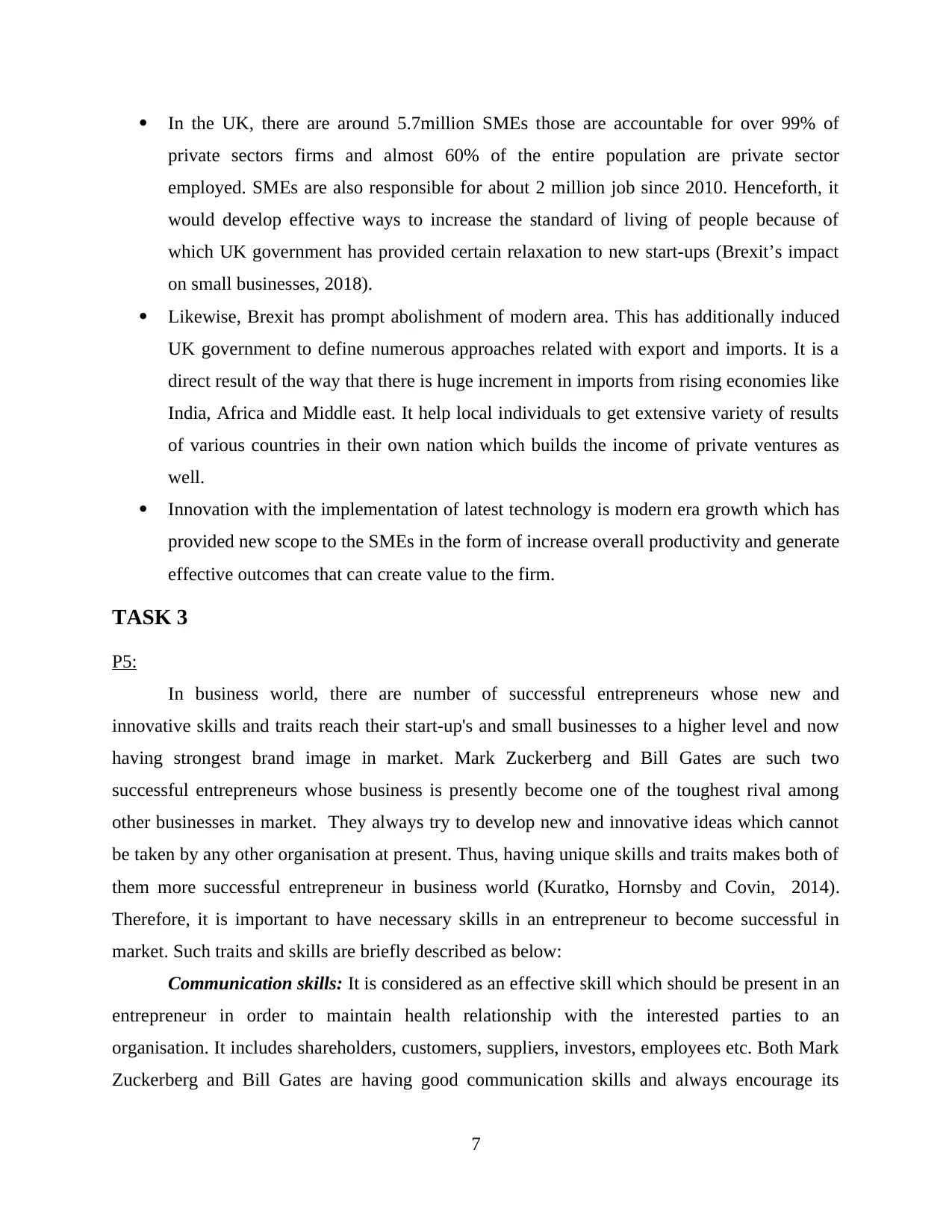
In the UK, there are around 5.7million SMEs those are accountable for over 99% of
private sectors firms and almost 60% of the entire population are private sector
employed. SMEs are also responsible for about 2 million job since 2010. Henceforth, it
would develop effective ways to increase the standard of living of people because of
which UK government has provided certain relaxation to new start-ups (Brexit’s impact
on small businesses, 2018).
Likewise, Brexit has prompt abolishment of modern area. This has additionally induced
UK government to define numerous approaches related with export and imports. It is a
direct result of the way that there is huge increment in imports from rising economies like
India, Africa and Middle east. It help local individuals to get extensive variety of results
of various countries in their own nation which builds the income of private ventures as
well.
Innovation with the implementation of latest technology is modern era growth which has
provided new scope to the SMEs in the form of increase overall productivity and generate
effective outcomes that can create value to the firm.
TASK 3
P5:
In business world, there are number of successful entrepreneurs whose new and
innovative skills and traits reach their start-up's and small businesses to a higher level and now
having strongest brand image in market. Mark Zuckerberg and Bill Gates are such two
successful entrepreneurs whose business is presently become one of the toughest rival among
other businesses in market. They always try to develop new and innovative ideas which cannot
be taken by any other organisation at present. Thus, having unique skills and traits makes both of
them more successful entrepreneur in business world (Kuratko, Hornsby and Covin, 2014).
Therefore, it is important to have necessary skills in an entrepreneur to become successful in
market. Such traits and skills are briefly described as below:
Communication skills: It is considered as an effective skill which should be present in an
entrepreneur in order to maintain health relationship with the interested parties to an
organisation. It includes shareholders, customers, suppliers, investors, employees etc. Both Mark
Zuckerberg and Bill Gates are having good communication skills and always encourage its
7
private sectors firms and almost 60% of the entire population are private sector
employed. SMEs are also responsible for about 2 million job since 2010. Henceforth, it
would develop effective ways to increase the standard of living of people because of
which UK government has provided certain relaxation to new start-ups (Brexit’s impact
on small businesses, 2018).
Likewise, Brexit has prompt abolishment of modern area. This has additionally induced
UK government to define numerous approaches related with export and imports. It is a
direct result of the way that there is huge increment in imports from rising economies like
India, Africa and Middle east. It help local individuals to get extensive variety of results
of various countries in their own nation which builds the income of private ventures as
well.
Innovation with the implementation of latest technology is modern era growth which has
provided new scope to the SMEs in the form of increase overall productivity and generate
effective outcomes that can create value to the firm.
TASK 3
P5:
In business world, there are number of successful entrepreneurs whose new and
innovative skills and traits reach their start-up's and small businesses to a higher level and now
having strongest brand image in market. Mark Zuckerberg and Bill Gates are such two
successful entrepreneurs whose business is presently become one of the toughest rival among
other businesses in market. They always try to develop new and innovative ideas which cannot
be taken by any other organisation at present. Thus, having unique skills and traits makes both of
them more successful entrepreneur in business world (Kuratko, Hornsby and Covin, 2014).
Therefore, it is important to have necessary skills in an entrepreneur to become successful in
market. Such traits and skills are briefly described as below:
Communication skills: It is considered as an effective skill which should be present in an
entrepreneur in order to maintain health relationship with the interested parties to an
organisation. It includes shareholders, customers, suppliers, investors, employees etc. Both Mark
Zuckerberg and Bill Gates are having good communication skills and always encourage its
7
⊘ This is a preview!⊘
Do you want full access?
Subscribe today to unlock all pages.

Trusted by 1+ million students worldwide
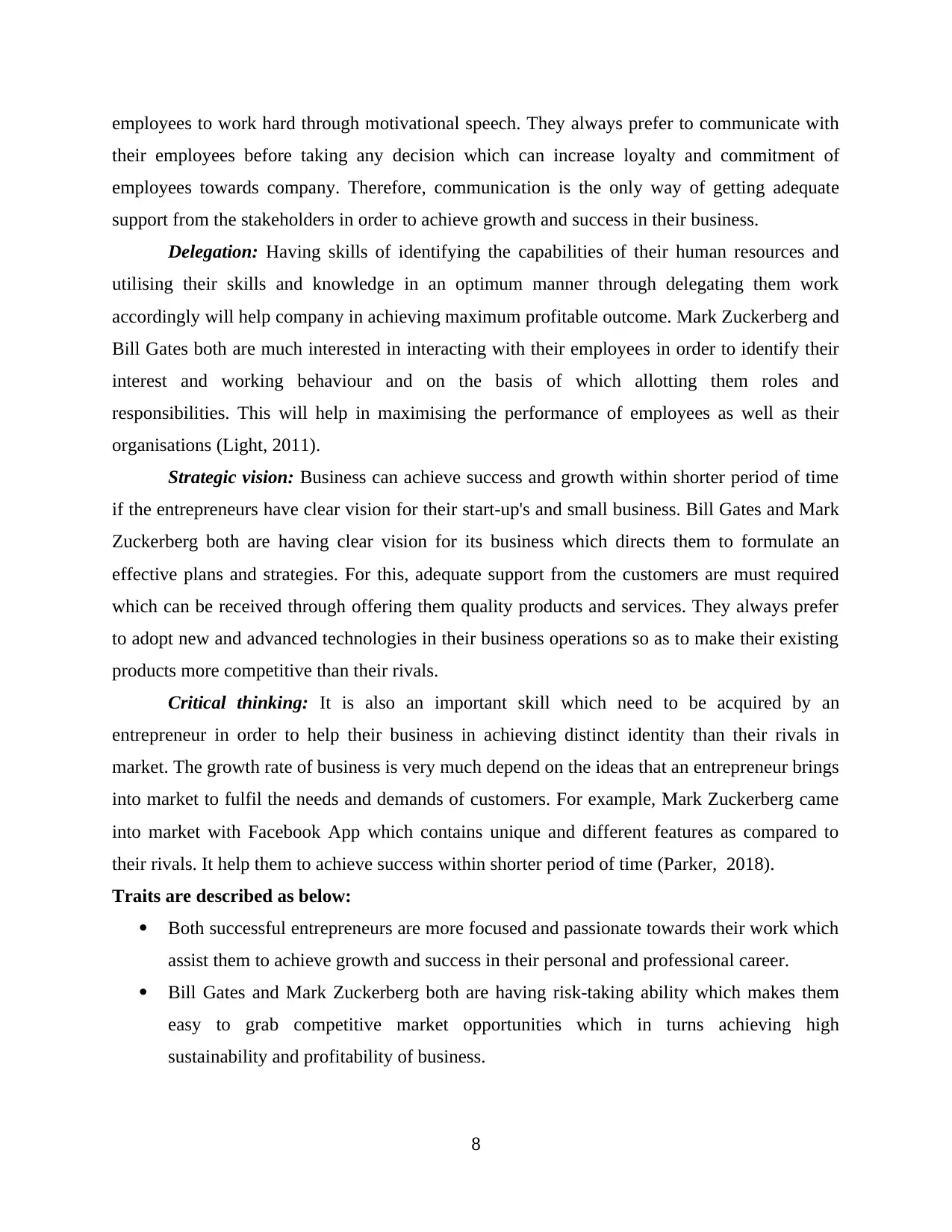
employees to work hard through motivational speech. They always prefer to communicate with
their employees before taking any decision which can increase loyalty and commitment of
employees towards company. Therefore, communication is the only way of getting adequate
support from the stakeholders in order to achieve growth and success in their business.
Delegation: Having skills of identifying the capabilities of their human resources and
utilising their skills and knowledge in an optimum manner through delegating them work
accordingly will help company in achieving maximum profitable outcome. Mark Zuckerberg and
Bill Gates both are much interested in interacting with their employees in order to identify their
interest and working behaviour and on the basis of which allotting them roles and
responsibilities. This will help in maximising the performance of employees as well as their
organisations (Light, 2011).
Strategic vision: Business can achieve success and growth within shorter period of time
if the entrepreneurs have clear vision for their start-up's and small business. Bill Gates and Mark
Zuckerberg both are having clear vision for its business which directs them to formulate an
effective plans and strategies. For this, adequate support from the customers are must required
which can be received through offering them quality products and services. They always prefer
to adopt new and advanced technologies in their business operations so as to make their existing
products more competitive than their rivals.
Critical thinking: It is also an important skill which need to be acquired by an
entrepreneur in order to help their business in achieving distinct identity than their rivals in
market. The growth rate of business is very much depend on the ideas that an entrepreneur brings
into market to fulfil the needs and demands of customers. For example, Mark Zuckerberg came
into market with Facebook App which contains unique and different features as compared to
their rivals. It help them to achieve success within shorter period of time (Parker, 2018).
Traits are described as below:
Both successful entrepreneurs are more focused and passionate towards their work which
assist them to achieve growth and success in their personal and professional career.
Bill Gates and Mark Zuckerberg both are having risk-taking ability which makes them
easy to grab competitive market opportunities which in turns achieving high
sustainability and profitability of business.
8
their employees before taking any decision which can increase loyalty and commitment of
employees towards company. Therefore, communication is the only way of getting adequate
support from the stakeholders in order to achieve growth and success in their business.
Delegation: Having skills of identifying the capabilities of their human resources and
utilising their skills and knowledge in an optimum manner through delegating them work
accordingly will help company in achieving maximum profitable outcome. Mark Zuckerberg and
Bill Gates both are much interested in interacting with their employees in order to identify their
interest and working behaviour and on the basis of which allotting them roles and
responsibilities. This will help in maximising the performance of employees as well as their
organisations (Light, 2011).
Strategic vision: Business can achieve success and growth within shorter period of time
if the entrepreneurs have clear vision for their start-up's and small business. Bill Gates and Mark
Zuckerberg both are having clear vision for its business which directs them to formulate an
effective plans and strategies. For this, adequate support from the customers are must required
which can be received through offering them quality products and services. They always prefer
to adopt new and advanced technologies in their business operations so as to make their existing
products more competitive than their rivals.
Critical thinking: It is also an important skill which need to be acquired by an
entrepreneur in order to help their business in achieving distinct identity than their rivals in
market. The growth rate of business is very much depend on the ideas that an entrepreneur brings
into market to fulfil the needs and demands of customers. For example, Mark Zuckerberg came
into market with Facebook App which contains unique and different features as compared to
their rivals. It help them to achieve success within shorter period of time (Parker, 2018).
Traits are described as below:
Both successful entrepreneurs are more focused and passionate towards their work which
assist them to achieve growth and success in their personal and professional career.
Bill Gates and Mark Zuckerberg both are having risk-taking ability which makes them
easy to grab competitive market opportunities which in turns achieving high
sustainability and profitability of business.
8
Paraphrase This Document
Need a fresh take? Get an instant paraphrase of this document with our AI Paraphraser
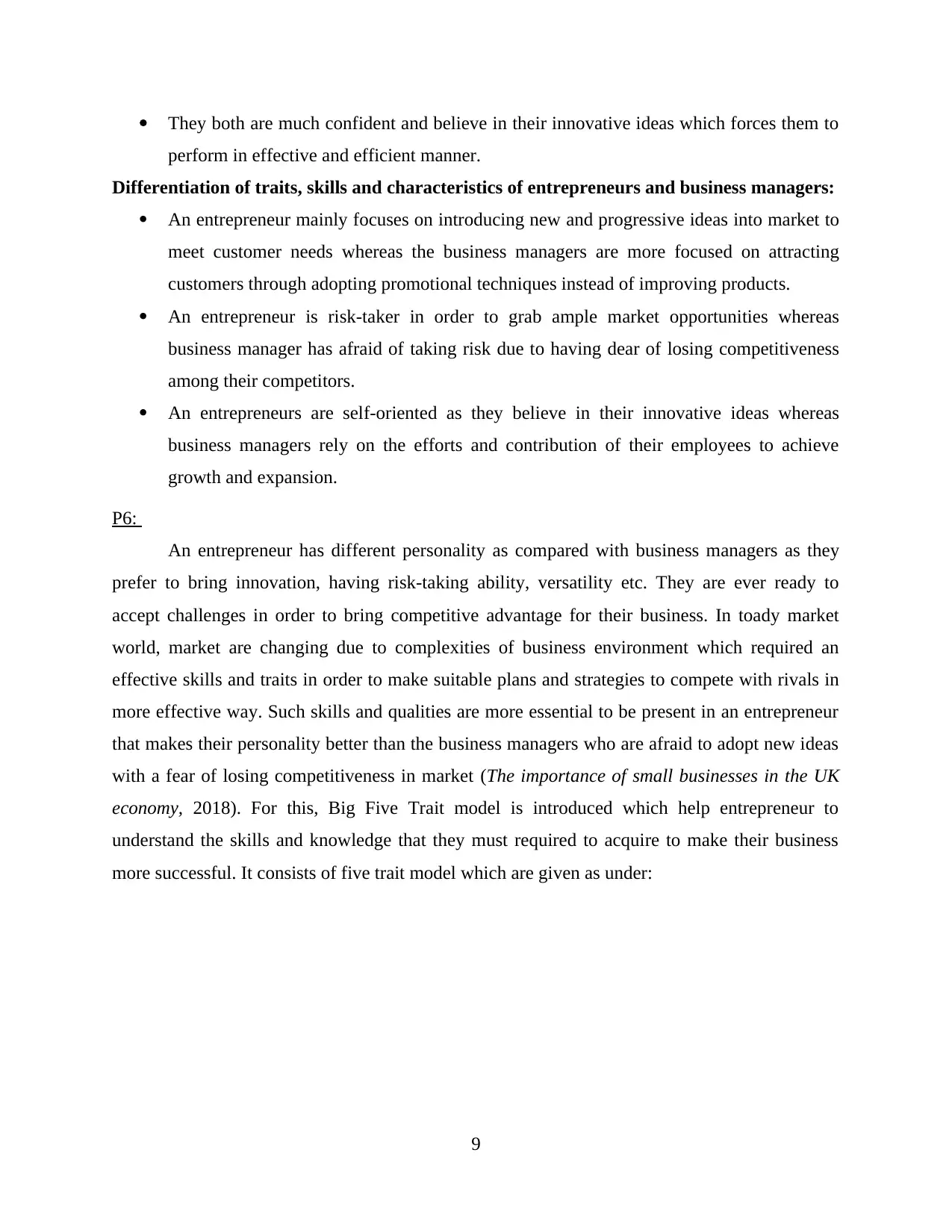
They both are much confident and believe in their innovative ideas which forces them to
perform in effective and efficient manner.
Differentiation of traits, skills and characteristics of entrepreneurs and business managers:
An entrepreneur mainly focuses on introducing new and progressive ideas into market to
meet customer needs whereas the business managers are more focused on attracting
customers through adopting promotional techniques instead of improving products.
An entrepreneur is risk-taker in order to grab ample market opportunities whereas
business manager has afraid of taking risk due to having dear of losing competitiveness
among their competitors.
An entrepreneurs are self-oriented as they believe in their innovative ideas whereas
business managers rely on the efforts and contribution of their employees to achieve
growth and expansion.
P6:
An entrepreneur has different personality as compared with business managers as they
prefer to bring innovation, having risk-taking ability, versatility etc. They are ever ready to
accept challenges in order to bring competitive advantage for their business. In toady market
world, market are changing due to complexities of business environment which required an
effective skills and traits in order to make suitable plans and strategies to compete with rivals in
more effective way. Such skills and qualities are more essential to be present in an entrepreneur
that makes their personality better than the business managers who are afraid to adopt new ideas
with a fear of losing competitiveness in market (The importance of small businesses in the UK
economy, 2018). For this, Big Five Trait model is introduced which help entrepreneur to
understand the skills and knowledge that they must required to acquire to make their business
more successful. It consists of five trait model which are given as under:
9
perform in effective and efficient manner.
Differentiation of traits, skills and characteristics of entrepreneurs and business managers:
An entrepreneur mainly focuses on introducing new and progressive ideas into market to
meet customer needs whereas the business managers are more focused on attracting
customers through adopting promotional techniques instead of improving products.
An entrepreneur is risk-taker in order to grab ample market opportunities whereas
business manager has afraid of taking risk due to having dear of losing competitiveness
among their competitors.
An entrepreneurs are self-oriented as they believe in their innovative ideas whereas
business managers rely on the efforts and contribution of their employees to achieve
growth and expansion.
P6:
An entrepreneur has different personality as compared with business managers as they
prefer to bring innovation, having risk-taking ability, versatility etc. They are ever ready to
accept challenges in order to bring competitive advantage for their business. In toady market
world, market are changing due to complexities of business environment which required an
effective skills and traits in order to make suitable plans and strategies to compete with rivals in
more effective way. Such skills and qualities are more essential to be present in an entrepreneur
that makes their personality better than the business managers who are afraid to adopt new ideas
with a fear of losing competitiveness in market (The importance of small businesses in the UK
economy, 2018). For this, Big Five Trait model is introduced which help entrepreneur to
understand the skills and knowledge that they must required to acquire to make their business
more successful. It consists of five trait model which are given as under:
9
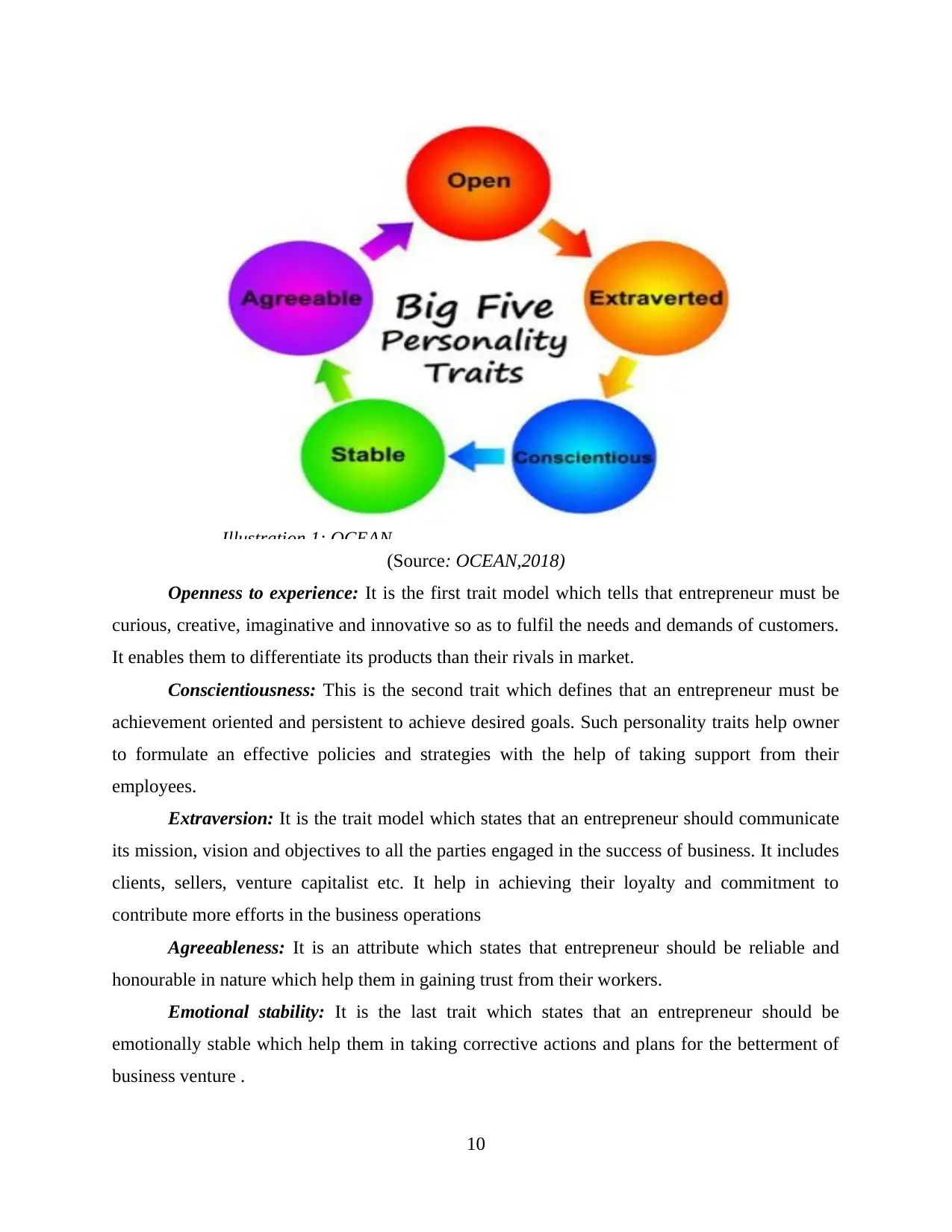
(Source: OCEAN,2018)
Openness to experience: It is the first trait model which tells that entrepreneur must be
curious, creative, imaginative and innovative so as to fulfil the needs and demands of customers.
It enables them to differentiate its products than their rivals in market.
Conscientiousness: This is the second trait which defines that an entrepreneur must be
achievement oriented and persistent to achieve desired goals. Such personality traits help owner
to formulate an effective policies and strategies with the help of taking support from their
employees.
Extraversion: It is the trait model which states that an entrepreneur should communicate
its mission, vision and objectives to all the parties engaged in the success of business. It includes
clients, sellers, venture capitalist etc. It help in achieving their loyalty and commitment to
contribute more efforts in the business operations
Agreeableness: It is an attribute which states that entrepreneur should be reliable and
honourable in nature which help them in gaining trust from their workers.
Emotional stability: It is the last trait which states that an entrepreneur should be
emotionally stable which help them in taking corrective actions and plans for the betterment of
business venture .
10
Illustration 1: OCEAN
Openness to experience: It is the first trait model which tells that entrepreneur must be
curious, creative, imaginative and innovative so as to fulfil the needs and demands of customers.
It enables them to differentiate its products than their rivals in market.
Conscientiousness: This is the second trait which defines that an entrepreneur must be
achievement oriented and persistent to achieve desired goals. Such personality traits help owner
to formulate an effective policies and strategies with the help of taking support from their
employees.
Extraversion: It is the trait model which states that an entrepreneur should communicate
its mission, vision and objectives to all the parties engaged in the success of business. It includes
clients, sellers, venture capitalist etc. It help in achieving their loyalty and commitment to
contribute more efforts in the business operations
Agreeableness: It is an attribute which states that entrepreneur should be reliable and
honourable in nature which help them in gaining trust from their workers.
Emotional stability: It is the last trait which states that an entrepreneur should be
emotionally stable which help them in taking corrective actions and plans for the betterment of
business venture .
10
Illustration 1: OCEAN
⊘ This is a preview!⊘
Do you want full access?
Subscribe today to unlock all pages.

Trusted by 1+ million students worldwide
1 out of 16
Related Documents
Your All-in-One AI-Powered Toolkit for Academic Success.
+13062052269
info@desklib.com
Available 24*7 on WhatsApp / Email
![[object Object]](/_next/static/media/star-bottom.7253800d.svg)
Unlock your academic potential
Copyright © 2020–2026 A2Z Services. All Rights Reserved. Developed and managed by ZUCOL.




